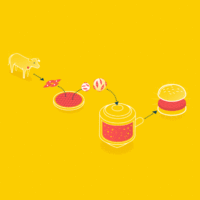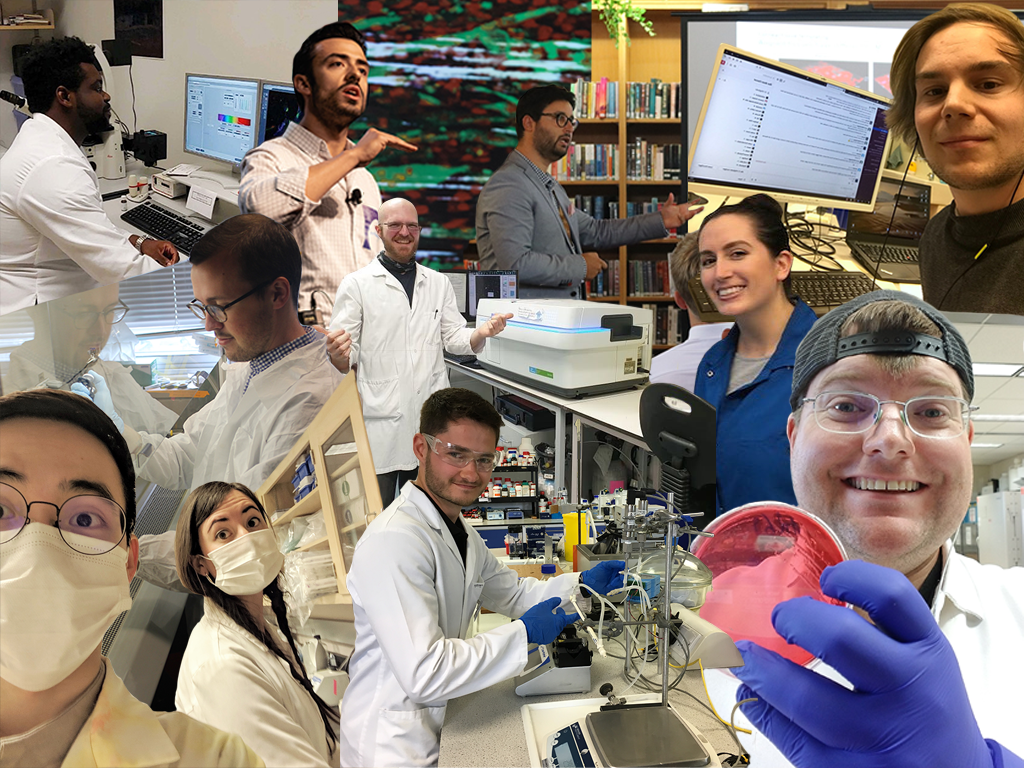- Overview
- Background
- Collaborators
Overview
Cellular Agriculture: Technology, Society, Sustainability and Science was designed to be the go-to reference for everyone in cellular agriculture - the textbook found in every company’s office, in every university lab, and in every aspiring student’s backpack.
The text provides a state-of-the-art review of cellular agriculture technologies, presenting foundational information with practical application insights. There are chapters on regulatory and policy issues, as well as reviews of the sustainability challenges of alternative proteins.
It is the first resource of its kind to take a practical approach to review the design, feasibility, and implementation of cellular agriculture techniques. With additional chapters on life cycle analyses and ideal transition scenarios, this book provides a resource for aspiring technology developers and academics alike seeking evidence-based assessments of the industry and its disruptive potential. The textbook was written by industry and academic experts for a balanced perspective of the field today and to inspire and shed light on a path forward.
Across 33 chapters and 7 sections, this book covers all aspects of cellular agriculture, from technical topics to social, legal, and ethical dimensions, authored by leading cellular agriculture researchers and product developers across the world.
The text was designed for industry and academic professionals interested in pursuing a career or research in cellular agriculture including new graduate students with undergraduate degrees in fields such as chemistry, engineering or food science.
New Harvest commissioned several images and image assets to be used throughout the textbook, creating an open source library of images for reports and presentations by students and industry alike.
Collaborators
This initiative was carried out in partnership with co-editors Dr. Evan Fraser at the Arrell Food Institute at the University of Guelph, Dr. Lenore Newman at the Food and Agricultural Institute at the University of Fraser Valley, Dr. Rickey Yada at the Faculty of Land and Food Systems at the University of British Columbia, and Dr. David Kaplan at Tufts University with support from New Harvest in selecting topics and securing authors.
Funders
Deepest gratitude to Richard Carlson and Erin Culley whose generous contributions made New Harvest’s role in this publication possible, and to Dr. David Kaplan will be donating his royalties of the textbook directly to New Harvest.
A Note on Open Access
For those tuned into the science publishing world, you may notice that publishing with Elsevier challenges our commitment to “default to open” as an organization. The truth is that the academic publishing landscape is more complex than we expected because it does not encourage open access.
While we explored all avenues to publish open access with Elsevier – including paying a $60k+ fee, which didn’t feel like an appropriate solution, we decided the book will benefit from a publisher that would have the widest distribution for the purpose of establishing the foundational work in the field. In the meantime, we are learning about open access and understanding policies, models, and options to make our resources accessible without just “buying” into the current system.
What is the best way to access the textbook without purchasing it? Through the old fashioned library system. Ask your local/university librarian if they take requests. Some libraries require physical proof of demand before they will order books. Go to your library’s website (or library system) and look for a section called “Recommend a title” “Suggest a Title for Purchase” etc. It’s often in the Contact Us tab.
See More Initiatives

Artificial Intelligence and Machine Learning in Cellular Agriculture
Cost and scale are major blockers to cellular agriculture's success, but they are complex technical and economic challenges. Artificial intelligence (AI) and machine learning (ML) techniques could help to accelerate much of this work, but there is very little public literature on the various applications and benefits. Given the potential exponential impact of AI/ML, New Harvest and Alberta Machine Intelligence Institute (Amii) launched the AI in Cell Ag Initiative.

Safety Initiative Phase III: Precompetitive Collaboration on Safety Research and Methods Development
The Cultured Meat Safety Initiative (CMSI) is a joint initiative between New Harvest and Vireo Advisors aiming to address critical technical, methodological, and informational challenges related to evaluating the safety of cultured meat (CM) products.
CMSI involves the convening of diverse stakeholders, including industry, governmental scientists, regulators, academic researchers, and others. Gaining such varied perspectives advances public knowledge and the practice of food safety for CM products by identifying and addressing data gaps. Research conducted to develop data and methods build the necessary support elements for the emerging ecosystem, which can raise regulatory and consumer confidence, support industry efforts toward commercialization, and improve the efficacy of evaluation processes of regulatory safety reviews.
Building on progress from Phase I and Phase II of CMSI, New Harvest and Vireo Advisors are now working to convene diverse stakeholders to create the infrastructure for shared knowledge, methods, and data that address the priorities identified in Phase I and II. Our long-term goal is to coordinate and launch regional efforts to develop and validate analytical methods for CM safety analysis and use these methods to generate datasets that can be made publicly available to support transparent food risk assessments and policy-making processes.

The New Harvest Fellowship
The New Harvest Fellowship Grant is for forward-thinking graduate or postdoctoral researchers in cellular agriculture who want to be leaders in the field. The fellowship provides dedicated research funding, an international support system, and leadership opportunities. Beyond just research funding, the overarching goal is to empower future technical leaders in the field.

